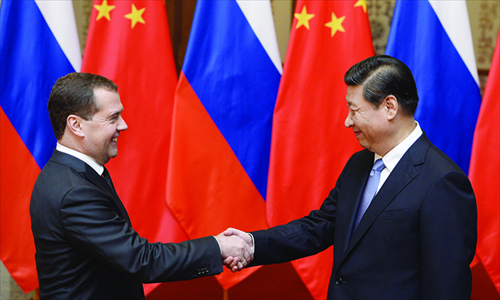China receives three PMs

Chinese President Xi Jinping (right) shakes hands with Russian Prime Minister Dmitry Medvedev before a meeting at the Great Hall of the People in Beijing on Tuesday. Photo: AFP
China Tuesday simultaneously received prime ministers from neighboring countries Russia, India and Mongolia, underlining an emphasis on peripheral diplomacy in its overall diplomatic strategy against the backdrop of the US pivot to the Asia-Pacific.
Tuesday's packed diplomatic activities started with the 18th regular meeting between the Chinese and Russian heads of government in Beijing, which saw the signing of an array of deals, followed by Russian Prime Minister Dmitry Medvedev's meeting with Chinese President Xi Jinping.
Indian Prime Minister Manmohan Singh arrived in Beijing on Tuesday evening for a three-day visit. He is scheduled to hold talks with Chinese Premier Li Keqiang and meet Xi on Wednesday.
Meanwhile, Mongolian Prime Minister Norov Altankhuyag visited Chengdu, Southwest China's Sichuan Province on Tuesday, before heading to Liaoning Province to improve economic ties and Beijing for talks with Chinese leaders, according to Mongolian media.
It's rare to have three foreign leaders make simultaneous visits.
"In recent months, China's efforts in peripheral diplomacy have been way more significant than I had imagined," Jin Canrong, a deputy dean of the School of International Studies at the Renmin University of China, told the Global Times.
The simultaneous visits came after President Xi and Premier Li's relayed visits to Southeast Asian countries earlier this month, signifying China's emphasis on relations with neighbors.
Shi Yinhong, a professor with the School of International Studies at the Renmin University of China, told the Global Times that the receiving of the leaders is also a response to the US pivot.
The US strategic pivot to Asia has put great pressure on China and triggered some problems in its neighboring region, Su Hao, director of the Asia-Pacific Research Center at the China Foreign Affairs University, told the Global Times. "Therefore, China needs to stabilize its neighboring environment and strengthen its relationship with neighboring countries, especially those big powers," he said.
During the meeting with Medvedev, Xi spoke highly of fruitful bilateral cooperation in global and regional affairs, adding they had safeguarded common interests and justice.
"Both Russia and China feel pressure from the US and the consolidation of China-Russia relations will contain the US' pivot to Asia," said Su.
As for India, the US has been trying to draw it to its side so as to establish a strategic circle from the Pacific to the Indian Ocean, the expert noted. "India is an independent power and the strengthening of Sino-Indian relations will help reduce the pressure from the US, and contain Washington's pivot," Su said.
After the meeting with Medvedev, Li said, "(We) reached many new consensuses on further advancing practical cooperation, especially on large-scale projects," adding they had witnessed the signing of 21 bilateral cooperation agreements.
Among the deals, energy cooperation is one of the most important achievements.
"(We) will supply an additional 10 million tons of crude oil each year (to China), which will be done by Russia's biggest oil company Rosneft. It means 100 million tons in the next 10 years, worth a total of $85 billion," said Medvedev in an online chat via Xinhuanet.com.
In a separate deal, Rosneft and China National Petroleum Corp (CNPC) agreed on supplies to a planned oil refining joint venture in Tianjin, Reuters reported.
Novatek, Russia's largest independent natural gas producer, agreed to supply 3 million tons per year of liquefied natural gas to CNPC, one of the partners in its $20 billion project on the Arctic Yamal peninsula. The deal covers a period of 15 years.
Meanwhile, Gazprom, the world's largest gas company, said that it had reached an agreement on a price formula to supply 38 billion cubic meters per year of gas by pipeline to China.
However, final price terms were not agreed, meaning talks are likely to run into 2014, according to Reuters.
Separately, in a written reply to a question raised by the Global Times, Manmohan Singh said India welcomes Chinese investment and the Chinese proposal to establish a Chinese Industrial Park in the country.
The prime minister said India faces an unsustainable imbalance in its trade with China and one of the ways of overcoming the trade deficit is for India to attract larger flows of foreign direct investment from China.
Xinhua contributed to this story